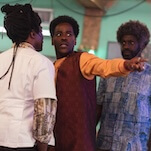What are we rooting for at this point in the story? I realize I can’t speak to a collective “we,” as every viewer is going to experience this story differently. But “Breaking The Fiberboard Ceiling” seems like a clear turning point. Do we want Red to torture Piscatella in retaliation for what he did to them? Do we want Gloria and Maria to let the guards free and release some of the tension from the situation, or do we want the guards to remain in danger so that Taystee has more leverage in her negotiations?
There’s not really a right answer to these questions. The show has been operating in a moral grey area since the first season, but the riot has pushed this to another level. When Red is pushing to torture Piscatella, Gina tries to draw a clear distinction: Piscatella was a Monster, but “Red is Red,” and that’s maybe the one utility of his monstrous and one-dimensional characterization. Eventually, the group dealing with Piscatella devolves into a shouting match, as they work through everything they’ve been through during the riot. They’ve each played some role or another in escalating things, and it puts them at odds right up until they realize that they share one central goal: they don’t want this to have been for nothing. And conveniently, they’re delivered a solution: Gina was taking cell phone video when Piscatella was assaulting Alex, meaning they have real evidence they can use instead of torturing him for a confession. At least in this part of the story, the moral dilemma has been resolved: he is their hostage until things blow over and they can seek justice.
But as we saw in the previous episode, Piscatella’s story is meaningfully isolated from everything else happening in the prison. The State doesn’t know he’s in the prison, nor does Taystee and the rest of the inmates—whatever happened in that story does not have immediate global consequences. By comparison, though, Maria and Gloria’s competing efforts to resolve the hostage situation for their own benefit is a different story. Gloria is contemplating doing something that will fundamentally end the ongoing negotiations, and Maria eventually follows through on her plan for her own self-interest, after telling her that she shouldn’t feel guilty about considering it. In Maria’s mind, “you don’t owe nothing to no one in here,” but that’s a difficult thing to reconcile with what we see happening with Red. Maria draws a clear line in the sand: her boyfriend and her daughter waiting for her—and he is waiting for her, given what we see here—on the outside are more important than any collective concern. But for Red, her “girls” are her family, and she only did everything she did during the riot in order to protect them from further punishment. Is Maria’s selfishness morally wrong? Is it more morally wrong than Gloria’s given that she knew she was upending Gloria’s ability to see her son but did it anyway? I don’t think there’s a clear answer to this.
As with so many cliffhangers this season, we end in the moment of chaos, and thus have no idea how this is going to play out. Every hostage but Caputo and Luschek—well, and Linda now, maybe—is in the wind, a development that will have an immediate impact on everything else that’s happening. How long until the negotiations break down? What will happen to the rest of the stories moving throughout the prison? The cause-and-effect of the story thus far has been mostly isolated, but this represents the first action that seems like it will touch every story equally. And so it’s interesting to see how the rest of the characters are positioned in an episode where the “plot” is about to take over in a big way, given that we don’t get a terribly large amount of movement in any individual story.
There are two primary thematic concerns here. One is motherhood, which we see emerge in Maria’s speech to Gloria and Nicky’s speech to the group about Red. Maria makes the case that motherhood makes you do things you would have never done before, and this is motivating both her and Gloria in their current situation. But we also see similar themes when Ouija—one of the two Latina sisters guarding the hostages—is spotted in one of Flaritza’s vlogs by her son, who reacts with shock when his mother terrorizes them. And we also get a glimpse of Black Cindy’s mother and daughter, as her daughter expresses concern for her “sister” that her mother struggles to share given the mess of their relationship. It echoes in Cindy’s efforts to play mother to Suzanne, a misguided random diagnosis of lithium that is nonetheless informed by the way Cindy used to care for her “sister,” a responsibility she never truly lived up to and still holds some resentment over when Taystee dresses her down.
The show has ruminated on motherhood before back in “Mother’s Day,” and in stories like Maria’s and Gloria’s. The central struggle is the idea that these women still feel responsible for their children despite no longer being able to support them directly. And that theme of responsibility is central here, as these women have to decide what specifically they are responsible to. Taystee is fighting on behalf of the entire prison, but she’s also prioritizing that over supporting Suzanne, a job that Black Cindy is not as deeply invested in. Taystee is not being “selfish” in choosing to negotiate on behalf of everything, but at the same time she is also very clearly enjoying the sense of purpose and power that she’s getting being part of these negotiations. She’s being given a chance to make a difference, and that becomes more important to her than ensuring Suzanne’s safety. Her refusal to try to balance those responsibilities strikes me as a crucial decision, even if she doesn’t see it as one, and raises the possibility that Suzanne might well be on a darker path than anyone might realize.
The negotiations were making progress: Taystee won on health care, and Fig’s exhaustion could prove to be to their advantage…if not for the guards who are about to make their way to the crowd of authorities outside the prison with a story to tell. What story will they tell, exactly? They have been isolated from much of the civility that has emerged during the riots: which is not to say that this would offset what they went through—it just won’t tell a complete picture of the events of the past 48 hours, something that only we have access to. We are the only arbiter of what’s happened in Litchfield that can put every part of this story into context, with glimpses of the prisoners, the guards, the authorities, and even their families on the outside. How we think the riot should end is a perspective developed through consideration of all these angles, and will heavily depend on which characters we relate to, and how optimistic we are that this will end in something close to an acceptable fashion.
I don’t think we’re all going to stand in the same place. But what I can say is that this is the first point in the season where the sheer gravity has really struck me. I stopped watching my screeners to write this review, but as I write I feel like I’m writing quicker so that I can get back to see what happens next. And while this is a natural byproduct of the Netflix binge structure, and you likely you just went ahead and kept watching after the fade to orange, typically I think of this as a sort of excitement of wanting to see where things go from here. But I am not excited about the end of this season: I am pleased, perhaps, that the dramatic stakes have finally all but exiled the comic relief (Leanne and Angie’s continued torture of Stratman happens off-screen here, notably), but at the core of my reaction to this episode is dread. I need to see what happens next because I need to know if it is as bad as I fear, and I need to know if I’m rooting for a dream that was never realistic. That “need” is a strength of the show and the season, regardless of the ups and downs, and one that promises a reckoning in the final hours of this story.
Stray observations
- So who would we say out of the women in the bunker has the MOST individual responsibility for how the riot situation has devolved? Red notes that no individual is ever responsible, but while they all had their fingers in something, some definitely did more than others.
- Lorna, who was only not part of Red’s group because she has terrible medical advice to dole out, is in fact pregnant, a development that isn’t surprising but I’m not entirely clear on how it will fit into the chaos about to unfold.
- Linda from Purchasing’s façade breaks down thanks to her cell phone, and Caputo’s photo in it: Boo’s presumption she’s a mole seems dangerous, but the truth isn’t a whole lot better at the end of the day.
- The visual of Piscatella’s head trapped in the farming “photo op” board is a nice bit of dark humor in an episode moving away from that mode.
- “I wish we could go back to the us of two days ago and tell us this is where we would be”—this is both very true, and makes me wonder when we’ll pickup in season six. Will we get some distance from these events? Or will we stay in the “aftermath,” where this type of reflection will still be common?
- What in the world was with the musical montage during Gloria’s movement of the guards? That was a complete tonal misfire, and just a bizarre choice I don’t understand—I liked the pan across the different porta-potties as a visual shot, but the song was a mess.
- I liked the move from the 1-2-3 on picking up Piscatella to Taystee’s “three years without a pap smear,” which is not the first time the show has done this type of cross-cutting this season.
- Flaritza has 2200 views on the video that Ouija’s kid is watching, and a few over 9,000 on some others, and I’m still confused where all those hits are coming from, but at least the numbers weren’t absurdly high.
- The other major development here is the complete deconstruction of the outdoor encampment due to the rain, and the inmates’ belief that negotiations were going well and Beyoncé might be coming. That both forces Maria to take drastic action and returns everyone under the same roof for the first time in a long time, which seems important to the final hours.







































